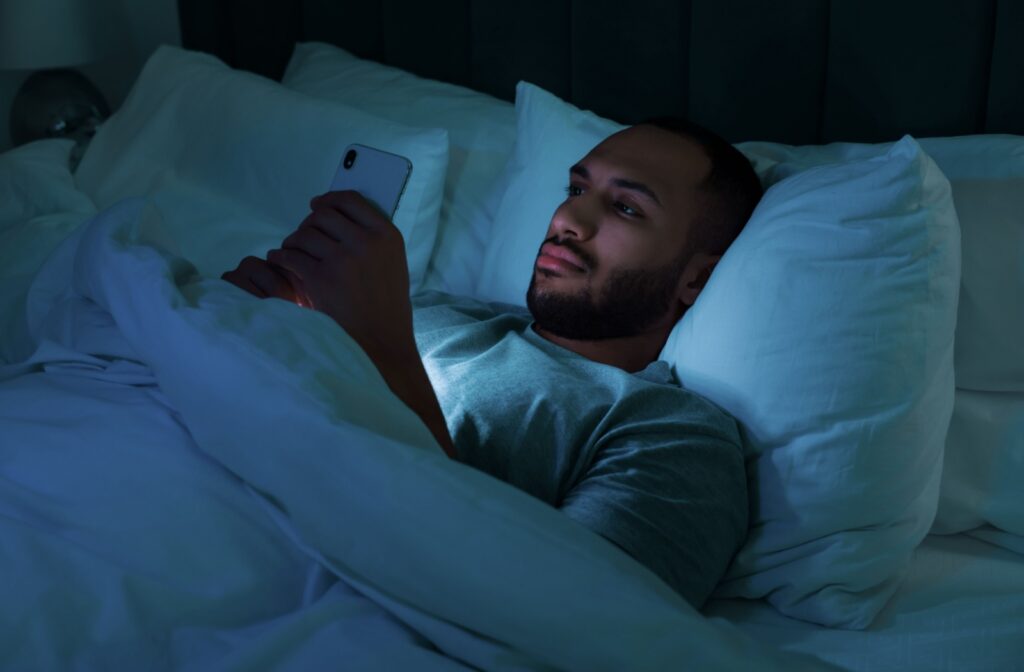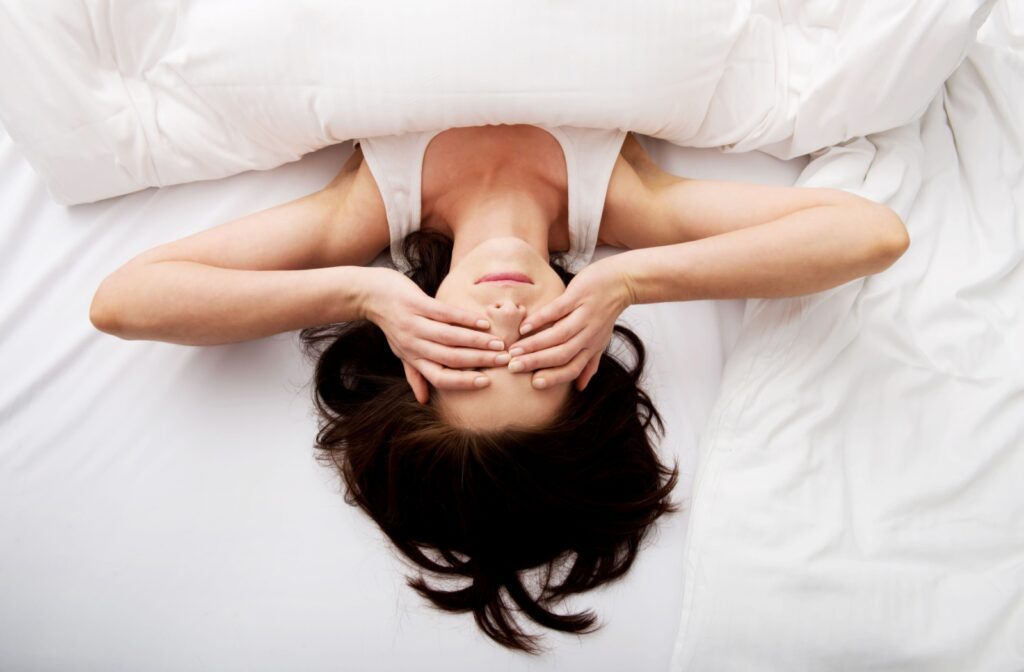Waking up with dry, gritty, and irritated eyes is an uncomfortable way to start the day. If you’re experiencing persistent dry eyes in the morning, sleep-related factors can exacerbate dry eye symptoms, causing you to experience irritation first thing in the morning.
Factors that disturb our tear film while sleeping, leading to dry eyes in the morning, can include:
- Incomplete lid closure
- Reduced tear production
- Environmental factors
- Contact lens use
- Screen use
Understanding Dry Eyes
Dry eyes refer to the dry, gritty sensation you may feel on the surface of your eye. It’s a common condition that occurs when your eye doesn’t receive the required moisture to keep the surface of your eye lubricated.
Tears play an important role in maintaining the health of the eye’s surface and providing clear vision. In some cases, dry eyes can lead to blurry vision, impacting visual clarity and our daily activities.
Dry eyes can develop in one of two ways: when your eyes don’t produce enough tears or when your tears evaporate too quickly.
Dry eyes can develop from several causes, including aging, medication, certain medical conditions, and environmental factors like allergies, windy or dry climates, and prolonged screen use.
Common symptoms of dry eyes typically include:
- Stinging or burning sensation in the eyes
- Redness and irritation
- Blurry vision
- Feeling like something is in your eyes
- Watery eyes
Some may find the severity of their dry eye symptoms to be mild at best, meaning that they experience discomfort that impacts their daily living.
Dry eyes aren’t considered a serious condition, but leaving them untreated can lead to complications. Dryness can worsen over time and lead to serious conditions like corneal damage and an increased risk of eye infections.
Connection Between Sleep & Dry Eyes
After waking up from a good night’s sleep, some individuals may experience aggravated dry eye symptoms. Surprisingly, there is a link between sleep and dry eyes. Dryness may develop while sleeping due to conditions that decrease tear production, increase tear evaporation, or both.
Incomplete Lid Closure
Nocturnal lagophthalmos occurs when the eyelids don’t fully close during sleep. When the eyelids don’t seal completely during sleep, the corneal surface is exposed to the air, which leads to the evaporation of the tear film. The exposure due to incomplete lid closure allows for moisture loss, resulting in dry, gritty eyes upon waking up.
Reduced Tear Production
During sleep, the body undergoes several physiological processes to promote rest and recovery, including tear production.
Typically, tear production slows during sleep because the eyes are generally closed, and the need for tear production diminishes naturally. For most people, this doesn’t cause any problems, but if you already have dry eyes, this reduction in tear production can exacerbate symptoms overnight.
Environmental Factors
Environmental factors such as low humidity, air conditioning, heating systems, and fans can exacerbate dry eye symptoms. These conditions can cause the tears to evaporate more quickly, leaving your eyes feeling dry and irritated.
During sleep, when tear production is naturally reduced, these environmental factors that enhance dryness in the room lead to dry eyes upon awakening.
Contact Lens Wear
Wearing contact lenses for extended periods, or sleeping with your contact lenses, can interfere with the natural tear film and exacerbate dry eye symptoms. Contact lenses sit directly on the corneal surface, creating a barrier that interferes with the natural tear film distribution.
Wearing lenses throughout the day, for extended periods, depletes eye moisture. The lack of moisture, and reduced tear production that naturally occurs while we sleep, can enhance dryness and eye irritation upon waking up.
Screen Use
While not directly related to sleep, using digital devices before bedtime can lead to eye strain, reduce blinking, and impact the quality of our sleep, enhancing dryness in the morning.
When individuals are engaged with digital devices late at night, they may unconsciously strain their eyes, impairing the natural resting and repair processes that typically occur during sleep.
Blue light emitted from screens can disrupt your natural sleep cycle, leading to poor sleep quality and incomplete eyelid closure during sleep. Plus, prolonged usage of digital devices often results in reduced blink rates, which can diminish tear distribution and increase tear evaporation.

Managing Dry Eyes
Dry eyes are a chronic condition that can’t be cured, but symptoms can be managed to reduce dryness and eye irritation using home remedies and advanced therapies.
Visiting your eye doctor for a dry eye therapy consult can help determine the cause of dryness. A thorough examination of the severity of dryness and assessing the tear film can help identify the type of dry eye you have, and recommend the most suitable treatment option for you.
If your dry eyes are a result of sleep-related factors, try making the following adjustments:
- Artificial Tears: Using preservative-free artificial tears before bed helps lubricate the eyes by mimicking natural tears.
- Eye Ointment: Apply an eye ointment to the lash line before bedtime to help retain moisture and prevent dryness throughout the night. The ointment is thick like a cream and will make your vision slightly blurry, which is why it’s best applied before bed.
- Warm Compress: Use a warm compress mask over your eyes and gently massage around the area before going to bed, to unclog meibomian glands and help stimulate tear production, prevent tear evaporation, and alleviate dryness.
- Use a Humidifier: Dry climates can enhance dryness. Using a humidifier in your bedroom can help reduce dryness in the air that can affect your eyes.
- Limit Screen Time: Reduce screen time before bed to reduce eye strain and blue light exposure which can disturb the quality of your sleep.
- Stay Hydrated: To promote overall hydration drink plenty of water throughout the day to prevent dryness. Aim to drink at least 8 to 10 glasses of water a day.
- Sleep Masks: Ask your doctor about sleep masks specifically designed for dry eye. They can help create a moisture-filled environment around your eyes while you sleep.
Incorporating these lifestyle changes into your routine can proactively mitigate dry eyes while sleeping and promote better eye health.
Schedule an Appointment
Dry eye symptoms in the morning can be exacerbated due to sleep-related factors. Implementing simple lifestyle changes can help alleviate dryness and promote better sleep and eye health!
For those experiencing persistent and severe dry eyes, despite implementing proactive home remedies, visiting your optometrist for advanced dry eye therapies can help.
Connect with our team at Vision Veritas Eyecare to schedule an appointment for your dry eye consultation.





